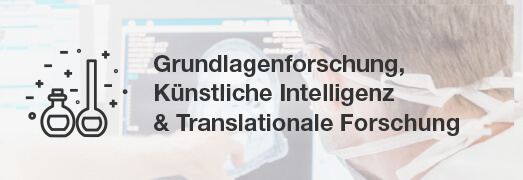Artificial Intelligence Group
Artificial Intelligence research is becoming ubiquitous in radiology. We develop algorithms that assist radiologists in their clinical duties by making their work faster, less error-prone and helping them make the right treatment decisions.
We are an interdisciplinary team of machine learning researchers and clinicians developing algorithms for image reconstruction, automatic medical image segmentation, prediction of molecular and metabolic tumour subtypes, patient survival and therapy response prediction and image-aided treatment planning.
Our key areas of focus are 3-dimensional computer vision, probabilistic modelling of complex and heterogenous datasets, secure and private artificial intelligence and the clinical deployment of AI algorithms.
Alexander Ziller, MSc.
Alina Dima, MSc.
Tamara Müller, MSc.
Moritz Knolle, BSc.
Friederike Jungmann, cand. med.
External Collaborators
Department of Computing, Imperial College London
London Medical Imaging and AI Centre for Value Based Healthcare
OpenMined
Departments of Radiology and West German Cancer Centre, University of Essen
Department of Radiology, LMU
Department of Radiology, Charité Berlin
German Cancer Consortium and German Cancer Research Centre
NYU Langone Medical Centre
Harvard Medical Centre
Internal Collaborators
Translational Oncologic Imaging Group
Advanced Data Analysis & Structuring Group
Body Magnetic Resonance Imaging Group
Department of Surgery, TUM
Department of Internal Medicine II, TUM
Department of Immunology, TUM
Department of Neuroradiology, TUM
Department of Paediatric Radiology, TUM
Funding (Selected)
German Research Foundation (DFG) SFB 824, Imaging for the selection, monitoring and individualization of cancer therapies
German Research Foundation (DFG), SPP 2177 Radiomics: Next Generation of Biomedical Imaging
German Cancer Consortium (DKTK) UPGRADE Programme
TUM Clinician Scientist Programme
TUM Foundation (TUM-Stiftung)
Bavarian Foundation for Research (Bayerische Forschungsstiftung) and Siemens AG: Early Detection and Classification of COVID-19 Pneumonia using Computed Tomography and Artificial Intelligence
TUM/Imperial College Joint Academy of Doctoral Studies
Kaissis, G.A., Makowski, M.R., Rückert, D. et al. Secure, privacy-preserving and federated machine learning in medical imaging. Nat Mach Intell 2, 305–311 (2020). https://doi.org/10.1038/s42256-020-0186-1(link is external)
Dantes Z, Yen HY, Pfarr N, et al. Implementing cell-free DNA of pancreatic cancer patient-derived organoids for personalized oncology. JCI Insight. 2020;137809. doi:10.1172/jci.insight.137809
Burian E, Jungmann F, Kaissis GA, et al. Intensive Care Risk Estimation in COVID-19 Pneumonia Based on Clinical and Imaging Parameters: Experiences from the Munich Cohort. J Clin Med. 2020;9(5):1514. Published 2020 May 18. doi:10.3390/jcm9051514
Kaissis GA, Jungmann F, Ziegelmayer S, et al. Multiparametric Modelling of Survival in Pancreatic Ductal Adenocarcinoma Using Clinical, Histomorphological, Genetic and Image-Derived Parameters. J Clin Med. 2020;9(5):1250. Published 2020 Apr 25. doi:10.3390/jcm9051250
Kaissis G, Ziegelmayer S, Lohöfer F, et al. A machine learning model for the prediction of survival and tumor subtype in pancreatic ductal adenocarcinoma from preoperative diffusion-weighted imaging. Eur Radiol Exp. 2019;3(1):41. Published 2019 Oct 17. doi:10.1186/s41747-019-0119-0
Kaissis G, Ziegelmayer S, Lohöfer F, et al. A machine learning algorithm predicts molecular subtypes in pancreatic ductal adenocarcinoma with differential response to gemcitabine-based versus FOLFIRINOX chemotherapy. PLoS One. 2019;14(10):e0218642. Published 2019 Oct 2. doi:10.1371/journal.pone.0218642
Christ PF, Ettlinger F, Grün F, Ezzeldin M Lipkova J, Schlecht S, Ahmaddy F, Tatavarty S, Bickel M, Bilic P, Rempfler M, Hofmann F, D Anastasi M, Ahmadi S, Kaissis G, Holch J, Sommer W, Braren R, Heinemann V, Menze B. Automatic Liver and Tumor Segmentation of CT and MRI Volumes using Cascaded Fully Convolutional Neural Networks, MICCAI 2017
Christ PF, Ettlinger F, Kaissis G, Schlecht S, Ahmaddy F, Grün F, Valentinitsch A, Ahmadi S, Braren R, Menze B. SurvivalNet: Predicting patient survival from diffusion weighted magnetic resonance images using cascaded fully convolutional and 3D convolutional neural networks, ISBI 2017
Bilic P, Christ PF, Vorontsov E, Chlebus G, Chen H, Dou Q, Fu CW, Han X, Heng PA, Hesser J, Kadoury S. The liver tumor segmentation benchmark (LITS). arXiv:1901.04056. 2019 Jan 13.
Kaissis GA, Lohöfer FK, Ziegelmayer S, et al. Borderline-resectable pancreatic adenocarcinoma: Contour irregularity of the venous confluence in pre-operative computed tomography predicts histopathological infiltration. PLoS One. 2019;14(1):e0208717. Published 2019 Jan 2. doi:10.1371/journal.pone.0208717








